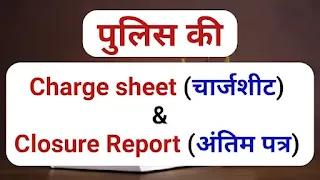When does the police present the termination report in a case?

When does the police present the report in a case?
————————————————–
We see that in many cases the police presents the elimination report. After all, what is this end report and what are the circumstances when the police presents the report.
Under Section 154 of the Penal Procedure, the police have been given the rights to file a cognizable offense case. When the FIR is registered in a case in the police station and during the investigation of the case, the investigator officer does not find so much evidence in the deliberation case, in the case, in the case, if the magistrate can be presented under the Challan (final report) Section 173 Penal Procedure, then the police report in such a case.
The elimination is mentioned in Section 169 of the Criminal Procedure Code. Under this section-
————————————————
“If on the exploration under this chapter, it appears to the police station’s Indian officer that sufficient evidence is not a proper basis of doubt, so that the accused is just a fair basis, in the case in which the officer is in custody, the person will specify such an officer, including the security, or a free -like officer, or if he is expected to execute the bond, that when the police will be a crime, when the police report will be made, then the police report will be given to such a crime. It is strong to consider him to consider him to make cognizance. “
When the evidence is inadequate, the case is presented to the first class magistrate concerned. The complainant of the concerned case is also presented in the magistrate’s court. The final approval is done in the case only after his statement. Until the court is approved, it does not end. According to the instructions of the Hon’ble Supreme Court, the final approval of the court is not given until the complainant or the victim is heard.
The Allahabad High Court has actually determined in the case of Shaukat Ali vs.
The final report under Section 169 has been submitted by the police on the basis of any first Itila report. If the validity of the police report is challenged by the petitioner, then the magistrate may direct the police to re -explore under Section 202 without taking cognizance of the offense under Section 190 of CRPC.
In such a situation, it will not be justified to dismiss the first information report and it is expected from the magistrate to record the fallacy of the final report as a complaint filed by the complaint and record the statement on the affidavit of the complainant and also record the statement of his Witnesses on the affidavit.
In the case of Bhagwant Singh vs. Police Commissioner, it has been determined that in any case without listening to any victim party, the police report cannot be presented to the magistrate by the police in any case.
When the FIR is false in a case, that is, the incident which the victim has reported in the police station concerned, is prima facie false, then the police impose the Khariji in that case.
For example, a person has reported in the police station that a person entered my house and stabbed me, the person who is accused of stabbing it, is living abroad at that time, then the report is primarily false in the case.
In such a case, the police puts Khariji. Khariji is not mentioned anywhere in the Criminal Procedure Code, but it is mentioned in the Madhya Pradesh Police Regulation Act Rules 728 and it is mentioned in different police manuals of different states. The Khariji report is presented only by the Senior Magistrate Chief Judicial Magistrate (Chief Judicial Magistrate) of the district.
D’s inter-Khati and Khariji
—————————————–
* In the Khatma case, the witness is applied when the Khariji is proved to be a false report in the case.
* The elimination can be presented to a first class magistrate concerned, but the Chief Judicial Magistrate of the district has the right to listen to Khariji.
* Before the final approval from the court of the Khatma Report, the court needs to listen to the complainant or the victim, but in Khariji, the court is not required to hear the complainant and the victim.
* In the case of Khatma, the police cannot submit a complaint in the first court by accusing the complainant of giving false reports under Section 182 and 211 of the Indian Penal Code against the victim, but in the case of Khariji, the police can submit a complaint against the reporter against the reporter under Section 182 and 211 of the Penal Code.
* In the case of Khatma, the victim person concerned can submit an appeal against the order of the first class magistrate’s court, while in Khariji, there is no appeal against the order of the Chief Judicial Magistrate.
* When evidence is sufficient during deliberation in a case, the matter is sent to the concerned magistrate according to Section 170 of the Criminal Procedure Code. When the exploration is over, the police officers submit a final report in the court as per Section 173 (2) of the Criminal Procedure Code.

